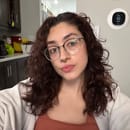I grew up in a Spanish-speaking household. Olimpica Stereo was the first sound I would wake up to on Sunday mornings. When I lost my first tooth, I anxiously awaited the arrival of El Ratón Pérez; the tooth fairy had nothing to do with it. On Christmas Eve, we would eagerly open our presents we believed to be from El Niño Dios, since Santa was never really in the picture for us.
While I was born in Canada, and have lived here my entire life, my parents are both proud Colombian immigrants. During my younger years, they tried to incorporate this culture into my and my sister’s lives. I remember begrudgingly taking merengue dance lessons in my basement, doing exercises in Spanish grammar workbooks, and being given Spanish storybooks to read.
I often met my parents with resistance. I wouldn’t dance at family events — I found the sway of my hips to be shameful, as I had no rhythm. I’d object to the school lunches packed for me, because if it wasn’t the Lunchables the other girls in my class had, I didn’t want it. This refusal of my culture was only further fueled by the lack of Hispanic and Latinx friends I had growing up. If there was no one else to bond with about these things outside of my household, then why bother?

By the time high school rolled around, I felt alienated from my own culture. It was easy enough to say I am Colombian and I could speak Spanish, but I still felt like I wasn’t checking all the boxes. My tentative desire to reconnect with my heritage during this time was overridden by my insecurities and anxieties as a high school-aged girl. I felt it was better to simply let my heritage sit untouched than to attempt to pick it up and risk any potential humiliation.
But, after seeing others’ joyful acceptance of their heritage, I had to stomach my jealousy and resentment at how easy it seemed for them. And it’s only now that I finally long to (re)connect with my heritage. I find myself missing the loud salsa music and being dragged by mis tías to the dancefloor. I am not particularly religious, but I miss La Novena, the nine days of prayers leading up to Christmas, if only because of its familiarity. There is nothing I can do to change how I acted as a child, dismissive and embarrassed. But I’ve realized that perhaps it is not too late to start weaving little pieces of my culture into my life as it is now.
The first thing I caved on was my willingness to dance. Maybe not at public functions, but in my own home, with friends, with my mother, I don’t hesitate anymore. When we’re cooking in the kitchen, the radio is playing and my mom playfully beckons me. I indulge her and clumsily follow in her footsteps. We laugh and we even get my little sister to join in.

As someone who already makes music a big part of her life, this was one the easiest aspects to include in my life. So, I’ve started making a conscious effort to listen to more Hispanic and Latinx music. While I’m still primarily a fan of what some might call the sad indie girl genre, the rhythms of my childhood are a gentle reassurance and good for dance breaks when I’m stressed.
Since becoming vegetarian about four years ago, I have started cooking for myself. While I stand by the ethical reasons for choosing this lifestyle, there is no denying that this choice caused a further divide between my culture and me. I couldn’t fully take part in family meals without drastically changing some recipes. It felt easier to just forget about Colombian meals entirely and make whatever was easiest for me.
But now I think: Why shouldn’t I just cook Colombian meals for myself? Admittedly it takes a a little more planning on my end but it’s well worth the effort. For instance, in my first year of university, I always found myself freezing after my commutes in the winter. I soon after learned how to make changua, a Colombian breakfast soup. Not only was it easy to make and would warm me up, but it also reminds me of meeting my grandmother for the first time in Bogota. I fondly remember the joy on my mother’s face when she realized what I had cooked. Changua has now become a regular in my rotation of student meals.

Although returning to and embracing familiar experiences has been so important for reestablishing my connection with my heritage, I still felt there was something left to be done. I wanted to have a more comprehensive understanding of Hispanic and Latinx culture. And regrettably, my knowledge of Colombia, its history, its politics, and its nuances, extends only as far as my infrequent, often sheltered visits and anecdotes told by family members that I used to find boring. So this year, I am taking an introductory course in Latinx and Latin American Studies. With the semester only having begun, I cannot say for certain if this will bring me closer to my heritage but I hope it does.
While there is still much I do not understand about my heritage and how I fit into it, I hope one day to feel at peace with it. I hope to always remember the way my mother rolls her Rs and to know how to pick a good tequila the same way my father does. I hope to always have my cafecitos in the mornings and to make buñuelos during the holidays. But most of all, I hope to never lose my connection to my heritage, no matter how small.


